#Nick Anglo
Text
I don't judge people for not drinking or smoking but these polls got me thinking about how some 12 years old in Belgium would literally be smoking and drinking. that's our cultural heritage
#it's become less of a thing nowadays but i literally grew up with kids like these nicking cigs off their moms packs#i got (very lightly) drunk for the first time with my cousins at a family funeral and i was probably 11#i think anglos can relate
12 notes
·
View notes
Note
Could you please expand on Anglo-Zionism, for those who’ve not read Milton deeply?
I don't actually know what Land is talking about; I was half-guessing, half-quipping. But I imagine it goes something like this. Many of the radical Protestant sects around the time of the English Revolution had a "judiazing" tendency, whether because they were millenarians and expected "the conversion of the Jews" as a prelude to Armageddon or because they were trying to purify the faith of Catholic ornament and therefore rooted themselves more strongly in the Hebrew Bible. Cromwell re-admitted the Jews to England in the 1650s (after their banishment in 1290). The Puritans who founded America—archetypal "Exiters" in Land's political vocabulary—saw themselves as typologically recapitulating and fulfilling the escape from captivity, the wandering in the wilderness, and the nation-building of the ancient Hebrews. Milton demotes both Greco-Roman epic and Anglo-Norman romance below Biblical subject matter early in Paradise Lost, with an implicit puritan rebuke to the likes of Chaucer and Spenser, even as he finds biblical precedent in his revolutionary polemics for dispatching the king. In short, English puritanism, one source of the libertarianism Land extols, had a philo-Semitic strain as part of its hatred of "Rome," a sense of affinity between English and Jewish people's history and destiny. Meanwhile, neoreaction's vision of breakaway polities in a global "patchwork" of sovereignties resembles Zionism, since Zionism's opposite, "diaspora," tends to imply not small discrete countries but some kind of empire (again, "Rome") with easy border crossings and no ethnic or religious requirements for citizenship. Now that the present political polarization requires a defense of Zionism from Land's side, if for no other reason than to own the libs, this is a convenient theoretical backing. But I'm not a historian, or even an historian, so I could possibly be off the track. Someone should ask him!
2 notes
·
View notes
Text
End of the line for corporate sovereignty
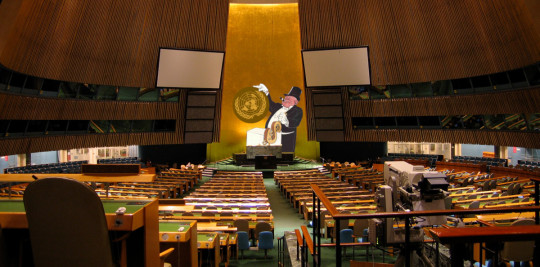
I'm on tour with my new, nationally bestselling novel The Bezzle! Catch me next weekend (Mar 30/31) in ANAHEIM at WONDERCON, then in Boston with Randall "XKCD" Munroe (Apr 11), then Providence (Apr 12), and beyond!

Back in the 1950s, a new, democratically elected Iranian government nationalized foreign oil interests. The UK and the US then backed a coup, deposing the progressive government with one more hospitable to foreign corporations:
https://en.wikipedia.org/wiki/Nationalization_of_the_Iranian_oil_industry
This nasty piece of geopolitical skullduggery led to the mother-of-all-blowbacks: the Anglo-American puppet regime was toppled by the Ayatollah and his cronies, who have led Iran ever since.
For the US and the UK, the lesson was clear: they needed a less kinetic way to ensure that sovereign countries around the world steered clear of policies that undermined the profits of their oil companies and other commercial giants. Thus, the "investor-state dispute settlement" (ISDS) was born.
The modern ISDS was perfected in the 1990s with the Energy Charter Treaty (ECT). The ECT was meant to foam the runway for western corporations seeking to take over ex-Soviet energy facilities, by making those new post-Glasnost governments promise to never pass laws that would undermine foreign companies' profits.
But as Nick Dearden writes for Jacobin, the western companies that pushed the east into the ECT failed to anticipate that ISDSes have their own form of blowback:
https://jacobin.com/2024/03/energy-charter-treaty-climate-change/
When the 2000s rolled around and countries like the Netherlands and Denmark started to pass rules to limit fossil fuels and promote renewables, German coal companies sued the shit out of these governments and forced them to either back off on their democratically negotiated policies, or to pay gigantic settlements to German corporations.
ISDS settlements are truly grotesque: they're not just a matter of buying out existing investments made by foreign companies and refunding them money spent on them. ISDS tribunals routinely order governments to pay foreign corporations all the profits they might have made from those investments.
For example, the UK company Rockhopper went after Italy for limiting offshore drilling in response to mass protests, and took $350m out of the Italian government. Now, Rockhopper only spent $50m on Adriatic oil exploration – the other $300m was to compensate Rockhopper for the profits it might have made if it actually got to pump oil off the Italian coast.
Governments, both left and right, grew steadily more outraged that ISDSes tied the hands of democratically elected lawmakers and subordinated their national sovereignty to corporate sovereignty. By 2023, nine EU countries were ready to pull out of the ECT.
But the ECT had another trick up its sleeve: a 20-year "sunset" clause that bound countries to go on enforcing the ECT's provisions – including ISDS rulings – for two decades after pulling out of the treaty. This prompted European governments to hit on the strategy of a simultaneous, mass withdrawal from the ECT, which would prevent companies registered in any of the ex-ECT countries from suing under the ECT.
It will not surprise you to learn that the UK did not join this pan-European coalition to wriggle out of the ECT. On the one hand, there's the Tories' commitment to markets above all else (as the Trashfuture podcast often points out, the UK government is the only neoliberal state so committed to austerity that it's actually dismantling its own police force). On the other hand, there's Rishi Sunak's planet-immolating promise to "max out North Sea oil."
But as the rest of the world transitions to renewables, different blocs in the UK – from unions to Tory MPs – are realizing that the country's membership in ECT and its fossil fuel commitment is going to make it a world leader in an increasingly irrelevant boondoggle – and so now the UK is also planning to pull out of the ECT.
As Dearden writes, the oil-loving, market-worshipping UK's departure from the ECT means that the whole idea of ISDSes is in danger. After all, some of the world's poorest countries are also fed up to the eyeballs with ISDSes and threatening to leave treaties that impose them.
One country has already pulled out: Honduras. Honduras is home to Prospera, a libertarian autonomous zone on the island of Roatan. Prospera was born after a US-backed drug kingpin named Porfirio Lobo Sosa overthrew the democratic government of Manuel Zelaya in 2009.
The Lobo Sosa regime established a system of special economic zones (known by their Spanish acronym, "ZEDEs"). Foreign investors who established a ZEDE would be exempted from Honduran law, allowing them to create "charter cities" with their own private criminal and civil code and tax system.
This was so extreme that the Honduran supreme court rejected the plan, so Lobo Sosa fired the court and replaced them with cronies who'd back his play.
A group of crypto bros capitalized on this development, using various ruses to establish a ZEDE on the island of Roatan, a largely English-speaking, Afro-Carribean island known for its marine reserve, its SCUBA diving, and its cruise ship port. This "charter city" included every bizarre idea from the long history of doomed "libertarian exit" projects, so ably recounted in Raymond Craib's excellent 2022 book Adventure Capitalism:
https://pluralistic.net/2022/06/14/this-way-to-the-egress/#terra-nullius
Right from the start, Prospera was ill starred. Paul Romer, the Nobel-winning economist most closely associated with the idea of charter cities, disavowed the project. Locals hated it – the tourist shops and restaurants on Roatan all may sport dusty "Bitcoin accepted here" signs, but not one of those shops takes cryptocurrency.
But the real danger to Prospera came from democracy itself. When Xiomara Castro – wife of Manuel Zelaya – was elected president in 2021, she announced an end to the ZEDE program. Prospera countered by suing Honduras under the ISDS provisions of the Central America Free Trade Agreements, seeking $10b, a third of the country's GDP.
In response, President Castro announced her country's departure from CAFTA, and the World Bank's International Centre for Settlement of Investment Disputes:
https://theintercept.com/2024/03/19/honduras-crypto-investors-world-bank-prospera/
An open letter by progressive economists in support of President Castro condemns ISDSes for costing latinamerican countries $30b in corporate compensation, triggered by laws protecting labor rights, vulnerable ecosystems and the climate:
https://progressive.international/wire/2024-03-18-economists-the-era-of-corporate-supremacy-in-the-international-trade-system-is-coming-to-an-end/en
As Ryan Grim writes for The Intercept, the ZEDE law is wildly unpopular with the Honduran people, and Merrick Garland called the Lobo Sosa regime that created it "a narco-state where violent drug traffickers were allowed to operate with virtual impunity":
https://theintercept.com/2024/03/19/honduras-crypto-investors-world-bank-prospera/
The world's worst people are furious and terrified about Honduras's withdrawal from its ISDS. After 60+ years of wrapping democracy in chains to protect corporate profits, the collapse of the corporate kangaroo courts that override democratic laws represents a serious threat to oligarchy.
As Dearden writes, "elsewhere in the world, ISDS cases have been brought specifically on the basis that governments have not done enough to suppress protest movements in the interests of foreign capital."
It's not just poor countries in the global south, either. When Australia passed a plain-packaging law for tobacco, Philip Morris relocated offshore in order to bring an ISDS case against the Australian government in a bid to remove impediments to tobacco sales:
https://isds.bilaterals.org/?philip-morris-vs-australia-isds
And in 2015, the WTO sanctioned the US government for its "dolphin-safe" tuna labeling, arguing that this eroded the profits of corporations that fished for tuna in ways that killed a lot of dolphins:
https://theintercept.com/2015/11/24/wto-ruling-on-dolphin-safe-tuna-labeling-illustrates-supremacy-of-trade-agreements/
In Canada, the Conservative hero Steven Harper entered into the Canada-China Foreign Investment Promotion and Protection Agreement, which banned Canada from passing laws that undermined the profits of Chinese corporations for 31 years (the rule expires in 2045):
https://www.vancouverobserver.com/news/harper-oks-potentially-unconstitutional-china-canada-fipa-deal-coming-force-october-1
Harper's successor, Justin Trudeau, went on to sign the Canada-EU Trade Agreement that Harper negotiated, including its ISDS provisions that let EU corporations override Canadian laws:
https://www.cbc.ca/news/politics/trudeau-eu-parliament-schulz-ceta-1.3415689
There was a time when any challenge to ISDS was a political third rail. Back in 2015, even hinting that ISDSes should be slightly modified would send corporate thinktanks into a frenzy:
https://www.techdirt.com/2015/07/20/eu-proposes-to-reform-corporate-sovereignty-slightly-us-think-tank-goes-into-panic-mode/
But over the years, there's been a growing consensus that nations can only be sovereign if corporations aren't. It's one thing to treat corporations as "persons," but another thing altogether to elevate them above personhood and subordinate entire nations to their whims.
With the world's richest countries pulling out of ISDSes alongside the world's poorest ones, it's feeling like the end of the road for this particularly nasty form of corporate corruption.
And not a moment too soon.

If you'd like an essay-formatted version of this post to read or share, here's a link to it on pluralistic.net, my surveillance-free, ad-free, tracker-free blog:
https://pluralistic.net/2024/03/27/korporate-kangaroo-kourts/#corporate-sovereignty

Image:
ChrisErbach (modified)
https://commons.wikimedia.org/wiki/File:UnitedNations_GeneralAssemblyChamber.jpg
CC BY-SA 3.0
https://creativecommons.org/licenses/by-sa/3.0/deed.en
#pluralistic#isds#investor state dispute settlement#steven harper#canada#canpoli#ukpoli#honduras#prospera#roatan#Energy Charter Treaty#ect#eu#rockhopper#world bank#charter cities#cryptocurrency#libertarian exit#Xiomara Castro
220 notes
·
View notes
Text
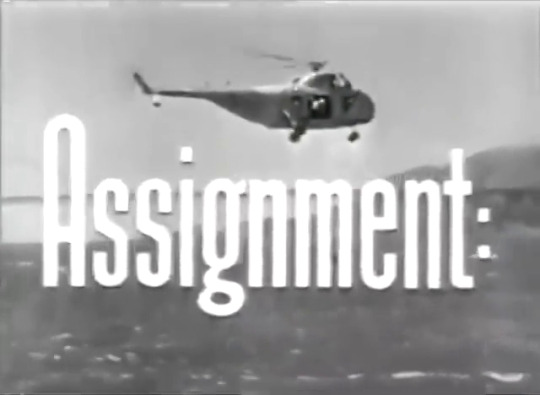

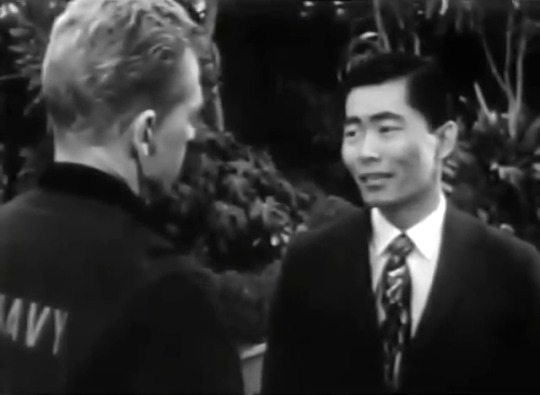

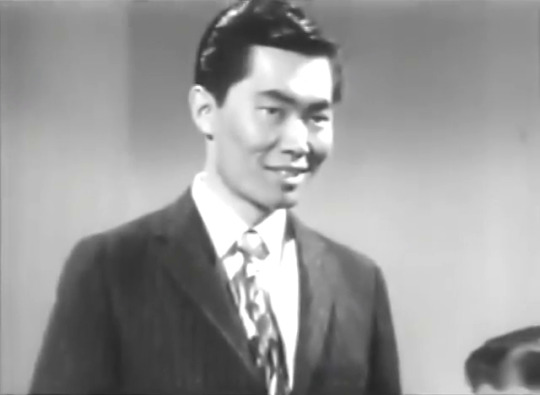

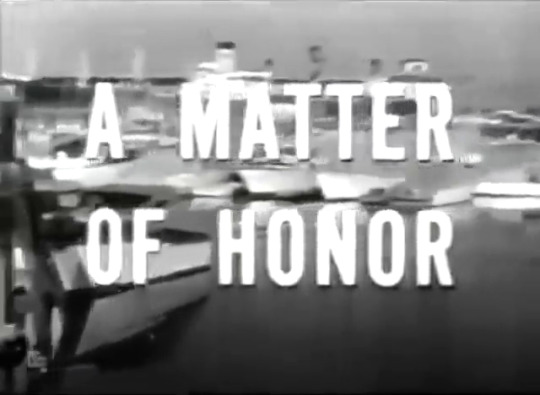
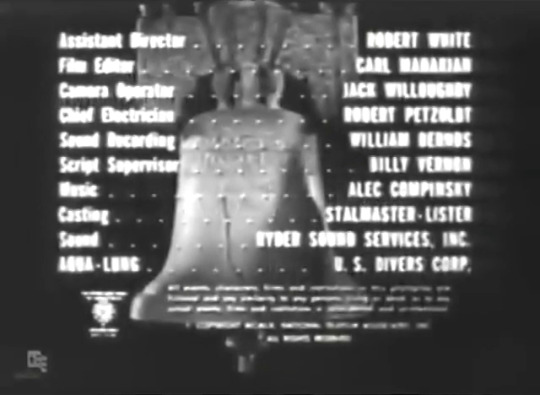
Today in the Department of Before They Were Star Trek Stars, George Takei guest stars in "A Matter of Honor," episode 10 of the single season of Assignment: Underwater (original air date November 11, 1960).
There are a couple of caveats here. Firstly, the only copy I could find of this episode was a very lo-res kinescope, but I thought it was interesting enough to make up for the fuzzy images.
Secondly, I wanted to take a minute to talk about depictions of non-Anglo cultures in this series of posts. Sometimes, I'm comfortable just shrugging and saying "Times were different back then" and sometimes I'm not. I've skipped over episodes where the use of yellowface or redface seemed gratuitous to me, or where there aren't any other things going on in the episode that made me feel it was worthy of note. I'm still on the fence about other episodes, where the depiction of BIPOC aren't necessarily negative, but are just kind of ignorant, or reliant on stale storytelling tropes, where you can tell that the White screenwriters didn't really make much of an effort at research, or consultation with people in the culture they're depicting. (NB: I don't think any of this reflects on the actors involved; sometimes you just need to pay your bills and do the best you can with the scripts you get.)
This episode of Assignment: Underwater feels like it might be dipping its toe into that last category. Japanese and Chinese culture are kind of lumped in together, there's some "model minority" stuff going on with the Japanese-American family, and Italian-Americans don't exactly come out smelling like roses. But I thought the episode was interesting enough to make it worthwhile. It's available for free on The Internet Archive, so I encourage anyone who's interested to watch and make up their own minds.
Takei plays Ken Kitigawa, the oldest son of an immigrant family who are friends with the main character, who is in charge of some kind of U.S. Navy underwater rescue/civil defense operation. Ken has gotten involved with an organized crime syndicate, who are sending him to sabotage the boat of one of their rivals. The hero stops him in the nick of time, he agrees to turn state's evidence, and everyone lives happily ever after.
Other Trek Connections:
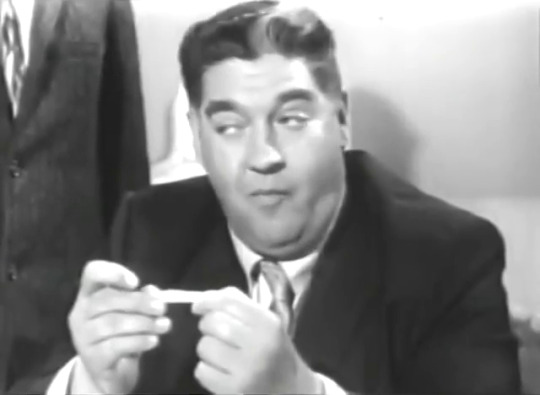

Takei's gangster boss is played by Stanley Adams, AKA Cyrano Jones in the Star Trek episode "The Trouble with Tribbles,"


And his girlfriend is portrayed by BarBara Luna, who played Marlena Moreau in the Star Trek episode "Mirror, Mirror," as well as appearing in two episodes of James Cawley's fan production Star Trek: Phase II.
#star trek#star trek tos#star trek the original series#assignment underwater#1960s tv#tv adventure#george takei#bill williams#stanley adams#barbara luna
40 notes
·
View notes
Text
nicholas d. wolfwood is latino and this is confirmed bc in episode 6 livio calls him “nico” (the common hispanic nickname for nicholas/nicolás) instead of “nick” (the common anglo nickname for nicholas). in this essay i will-
45 notes
·
View notes
Text
youtube
Los que me conocen bien saben que no soy precisamente un gran fan de Nick Cave, pero me quito el sombrero con lo que hizo ayer con "A Rainy Night In Soho" de los Pogues en el funeral multitudinario de Shane McGowan, una versión sentida y sobria.
La procesión de despedida partió desde Ballsbridge con la gente entonando “Dirty Old Town” y “Fairytale Of New York”, y concluyó en la iglesia de Santa María del Rosario en Nenagh, condado de Tipperary, donde MacGowan solía asistir a misa.
Shane McGowan ha sido enterrado en un sencillo ataúd de mimbre cubierto por la bandera de Irlanda.
Abajo la fantástica versión original de la banda anglo-irlandesa incluida en el extended play "Poguetry in Motion" (1986).
youtube
6 notes
·
View notes
Text

Alistair Cooke, Christmas Eve, 1952. Cover by Marc Simont.
A mid-century English holiday tradition was the Christmas Eve radio broadcast by Anglo-American journalist Alistair Cooke. In each year’s program, he would tell a story pertaining to the celebration of Christmas in America. Though he claimed they were fact, they read suspiciously like fiction. One year a story involved a man in training to be a department store Santa. Another year detailed the plight of a Southern California family who had never experienced a white Christmas. The manuscripts for those stories were collected into this illustrated book.
Source: Nick Harvill Libraries
#New York#NYC#vintage New York#1950s#Alistair Cooke#Marc Simont#Christmas Eve#radio#vintage radio#vintage Christmas
46 notes
·
View notes
Photo





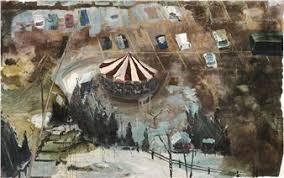



Nick Goss (b. Bristol, 1981) is an Anglo Dutch painter whose (essentially figurative) paintings suggest apparently contradictory readings. On one hand there is the recognisable specificity of objects and environments rooted in factual, documentary reality: a photographic starting point perhaps, or an archival image offering an intensely palpable sense of place or experience.
On the other there is always something more liminal at play - an uncertainty and otherness that never quite explains itself.It is in this ambiguity and sometimes dreamlike strangeness that these images reveal their power and presence. They have an unreliable relationship to time, being connected to memory and a kind of nostalgia, and yet existing precisely in their own moment. They are built slowly in thin layers of often muted pigment over screen-printed images, with small shifts of focus that simultaneously coalesce and fragment.
At times they slide towards abstraction in form, but never in mood, which almost always remains resolutely tangible.Nick Goss has exhibited widely in Europe and America and has work in many distinguished collections including the Metropolitan Museum of Art; Dallas Museum of Art; Cleveland Museum of Art and the Zabludowicz Collection, London. Recent exhibitions include: The Undercurrents at Mathew Brown, Los Angeles; Margaritas at the Mall, Contemporary Fine Arts, Berlin; Nine Mile Burn at Josh Lilley, London and Morley’s Mirror at Pallant House Art Gallery. His first exhibition at Ingleby will open in October 2023.
https://www.inglebygallery.com/.../411-nick-goss/overview/
20 notes
·
View notes
Photo
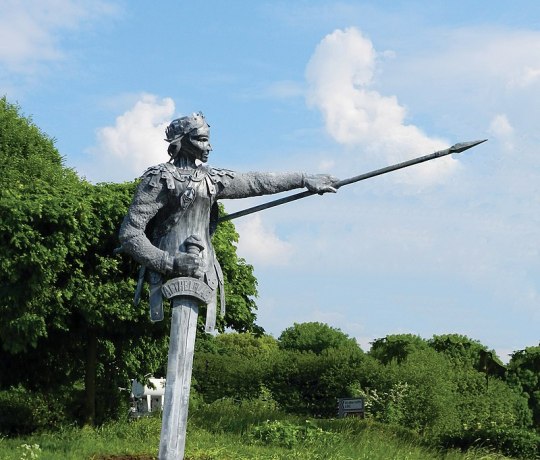
The new Æthelflaed statue outside Tamworth Railway Station, erected to commemorate 1,100 years since her death in Tamworth. Her spear points visitors towards the town centre and Tamworth Castle.
Æthelflæd, Lady of the Mercians (c. 870 – 12 June 918) ruled Mercia in the English Midlands from 911 until her death. She was the eldest daughter of Alfred the Great, king of the Anglo-Saxon kingdom of Wessex, and his wife Ealhswith.
Æthelflæd was born around 870 at the height of the Viking invasions of England. By 878, most of England was under Danish Viking rule – East Anglia and Northumbria having been conquered, and Mercia partitioned between the English and the Vikings – but in that year Alfred won a crucial victory at the Battle of Edington. Soon afterwards the English-controlled western half of Mercia came under the rule of Æthelred, Lord of the Mercians, who accepted Alfred's overlordship. Alfred adopted the title King of the Anglo-Saxons (previously he was titled King of the West Saxons like his predecessors) claiming to rule all Anglo-Saxon people not living in areas under Viking control. In the mid-880s, Alfred sealed the strategic alliance between the surviving English kingdoms by marrying Æthelflæd to Æthelred.
Æthelred played a major role in fighting off renewed Viking attacks in the 890s, together with Æthelflæd's brother, the future King Edward the Elder. Æthelred and Æthelflæd fortified Worcester, gave generous donations to Mercian churches and built a new minster in Gloucester. Æthelred's health probably declined early in the next decade, after which it is likely that Æthelflæd was mainly responsible for the government of Mercia. Edward had succeeded as King of the Anglo-Saxons in 899, and in 909 he sent a West Saxon and Mercian force to raid the northern Danelaw. They returned with the remains of the royal Northumbrian saint Oswald, which were translated to the new Gloucester minster. Æthelred died in 911 and Æthelflæd then ruled Mercia as Lady of the Mercians. The accession of a female ruler in Mercia is described by the historian Ian Walker as "one of the most unique events in early medieval history".
Alfred had built a network of fortified burhs and in the 910s Edward and Æthelflæd embarked on a programme of extending them. Among the towns where she built defences were Wednesbury, Bridgnorth, Tamworth, Stafford, Warwick, Chirbury and Runcorn. In 917 she sent an army to capture Derby, the first of the Five Boroughs of the Danelaw to fall to the English, a victory described by Tim Clarkson as "her greatest triumph". In 918 Leicester surrendered without a fight. Shortly afterwards the Viking leaders of York offered her their loyalty, but she died on 12 June 918 before she could take advantage of the offer, and a few months later Edward completed the conquest of Mercia. Æthelflæd was succeeded by her daughter Ælfwynn, but in December Edward took personal control of Mercia and carried Ælfwynn off to Wessex.
Historians disagree whether Mercia was an independent kingdom under Æthelred and Æthelflæd but they agree that Æthelflæd was a great ruler who played an important part in the conquest of the Danelaw. She was praised by Anglo-Norman chroniclers such as William of Malmesbury, who described her as "a powerful accession to [Edward's] party, the delight of his subjects, the dread of his enemies, a woman of enlarged soul". According to Pauline Stafford, "like ... Elizabeth I she became a wonder to later ages". In Nick Higham's view, medieval and modern writers have been so captivated by her that Edward's reputation has suffered unfairly in comparison.
83 notes
·
View notes
Text
On Epic Heroes & Hobbit-Holes
"In a hole in the ground, there lived a hobbit."
The opening line of The Hobbit is one of the most charming yet simplistic in British literature. It's the perfect segue into the fact that Tolkien, in the course of developing Middle-earth, drew inspiration from many sources of Anglo-Saxon literature, notably Beowulf (which is arguably the opposite of simple). His lecture, "Beowulf: The Monsters and the Critics", gave him academic fame. In fact, the term "Middle-earth" is even used in Beowulf. The quests, the act of defeating of monsters, and the poems/songs scattered throughout Tolkien's works are heavily reminiscent of the style of the epic poem. However, I want to focus on how Tolkien deviates--in both character and symbolism--from Beowulf.
That being said, many parallels have been made between the character of Beowulf and Beorn in The Hobbit: both are larger-than-life warriors, and although Beorn means "bear", it can also mean "warrior". So it makes sense Beorn should be the protagonist--Tolkein's own epic hero.
Yet Beorn is not. In fact, he is a minor character. Who do we get as the protagonist in this epic poem of a children's story, then? Surely someone as heroic as Beorn?
Nope. Meet Bilbo Baggins, everybody. He just wants to get thirteen dwarves out of his house and live in peace. Oh, and there's a wizard. Bilbo is the polar opposite of Beowulf: completely ordinary, sedentary, and slightly eccentric. As Nick Groom writes in Tolkien in the Twenty-First Century: The Meaning of Middle-Earth Today,
"...in a long letter written in 1951 [Tolkien] described [The Hobbit] as 'the study of a simple ordinary man, neither artistic nor noble and heroic' if 'not without the underdeveloped seeds of these things' ".
When all is said and done, that is what is at the center of The Hobbit. The simplicity of Bilbo's lifestyle contributes to the complexity of his character. While Beowulf abides by the Scandinavian heroic code and kills in the name of honor and duty, Bilbo as a main character falls into the shades of gray. He is kind and witty, yet is employed as a thief to rob and lie throughout the book; he takes the Arkenstone from Smaug (more on him later) simply because he is vain and it is shiny. Yet he is brave and risks his life to save his dwarf friends on numerous occasions. He also willingly gives up said Arkenstone for a chance at peace, though it backfires. While the (intended) theme of Beowulf is how one can only gain renown and loyalty by doing honorable deeds, The Hobbit is about adventure, courage, branching out, and most importantly, trying to do good even though you might not know what you're doing.
Bilbo's story focuses on the contradictory actions of life, and how the road to self-discovery includes a lot of stumbling and regrets; he is but a humble hobbit, but rather than rejecting that to become a graceful hero, he embraces it. This is in great juxtaposition to Smaug and the dragon in Beowulf, both of which depict power and greed. In both texts, the dragon is wakened in exactly the same way: a person (or hobbit) enters the dragon's cave and steals and golden goblet, unleashing the dragon's fury and causing him to set fire to nearby villages.
In Beowulf, the death of the dragon--and the subsequent death of Beowulf himself--contrast each other in terms of legacy. For example, while Beowulf is remembered as a heroic warrior and a good king, the dragon is described as such:
"[Beowulf's] nightmarish destroyer, lay destroyed as well, / utterly without life... / the sky-roamer lay there rigid, brought low beside the treasure-lodge"
The dragon, although he perished next his mound of gold, is nothing in death despite being surrounded by riches; the beast shows the shallowness of greed as opposed to honor. However, the dragon (or rather, his treasure) in The Hobbit symbolizes the corruption of greed: the dragon does nothing but sit on his pile of gold, but the influence of said gold corrupts not only the dragon (through fueling his greed) but Thorin as well, showing how power corrodes one's morality.
The excess of materialism and war compared to the strength of friendship and uncertainty is central to the story of Bilbo Baggins. In addition, it demonstrates how an author can borrow heavily from a pre-published text without necessarily adopting it's message: for what it's worth, I prefer the message of The Hobbit over many classics--a testament to the strength of a home-loving creature that is nevertheless always "quite ready for another adventure".
#the hobbit#bilbo baggins#smaug the dragon#middle earth#tolkein#beowulf#seamus heaney#classic literature#tolkien meta
4 notes
·
View notes
Text
Nick Goss (b. Bristol, 1981) is an Anglo Dutch painter whose (essentially figurative) paintings suggest apparently contradictory readings. On one hand there is the recognisable specificity of objects and environments rooted in factual, documentary reality: a photographic starting point perhaps, or an archival image offering an intensely palpable sense of place or experience. On the other there is always something more liminal at play - an uncertainty and otherness that never quite explains itself.
It is in this ambiguity and sometimes dreamlike strangeness that these images reveal their power and presence. They have an unreliable relationship to time, being connected to memory and a kind of nostalgia, and yet existing precisely in their own moment. They are built slowly in thin layers of often muted pigment over screen-printed images, with small shifts of focus that simultaneously coalesce and fragment. At times they slide towards abstraction in form, but never in mood, which almost always remains resolutely tangible.
Nick Goss has exhibited widely in Europe and America and has work in many distinguished collections including the Metropolitan Museum of Art; Dallas Museum of Art; Cleveland Museum of Art and the Zabludowicz Collection, London. Recent exhibitions include: The Undercurrents at Mathew Brown, Los Angeles; Margaritas at the Mall, Contemporary Fine Arts, Berlin; Nine Mile Burn at Josh Lilley, London and Morley’s Mirror at Pallant House Art Gallery.
Smickel Inn, Balcony of Europe, Ingleby's first solo exhibition with Goss, which includes a number of new paintings and watercolours, is currently on view at the gallery. To celebrate the show, a new 116pp publication, Smickel Inn, has been published by Ingleby, Matthew Brown and Anomie.
2 notes
·
View notes
Note
hey there!! could i please get a bit of fc help, whenever you've got the time? i'm looking for a man in his mid-twenties to early-thirties, with long hair? i know it's all a bit vague, but any suggestions you've got would be amazing! thank you!
Xavier de Guzman (1988) Filipino.
Jesse Rath (1989) Goan Indian / Ashkenazi Jewish.
Chai Hansen (1989) Thai / Unspecified Australian.
Frank Waln (1989) Sicangu Oyate Lakota Sioux.
Tony Thornburg (1990) Japanese / Swedish.
Dev Patel (1990) Gujarati Indian.
Aaron Taylor-Johnson (1990) English, Ashkenazi Jewish, small amount of Irish.
Nathaniel Curtis (1990) Indian / English - is gay.
Kiowa Gordon (1990) Hualapai, English, Scottish, Danish, Manx.
Avi Nash (1991) Indian.
Jade Hassouné (1991) Lesbanese - is queer - when he was in Shadowhunters.
Brock O'Hurn (1991)
Jordan Rodrigues (1992) Malaysian.
Alexander Hodge (1992) Chinese Singaporean / Irish.
Tommy Martinez (1992) Venezuelan.
Dylan Cook (1992) Ojibwe.
Joe Keery (1992)
Maxence Danet-Fauvel (1993)
Sebastian Chacon (1993) Colombian / Ecuadorian.
Eduardo Franco (1994) Mexican.
Shayan Sobhian (1994) Persian Baha'i / Russian Jewish.
Louis Kurihara (1994) Japanese / British.
Chris De'Sean Lee (1994) African-American.
Kenton Duty (1995)
Nick Robinson (1995)
Ross Lynch (1995)
Román Zaragoza (1996) Akimel O’odham, Mexican, Japanese, and Taiwanese.
Maxim Baldry (1996) English, distant German / Georgian, Russian.
Tamino (1996) Egyptian, Belgian, Lebanese.
Aria Shahghasemi (1996) Iranian.
Odiseas Georgiadis (1996) Ghanaian / Greek.
Elliot Fletcher (1996) - is trans.
Josh Heuston (1996) Anglo Sri Lankan.
Luke Eisner (1996)
Tony Revolori (1996) Guatemalan [Spanish and Unspecified Indigenous], possibly other.
Baker Boy (1996) Yolngu.
Jacob Romero (1996) Afro Jamaican.
Luka Sabbat (1997) Irish, English, German, Haitian.
Murakami Nijiro (1997) Japanese.
All of these are of varying lengths but I consider them all to be long!
6 notes
·
View notes
Note
Any thoughts on nick land / mark fisher?
I've encountered both of them essentially as bloggers—I don't think I've ever read a word of either on paper—so I can't say I've studied them formally or mastered their thinking.
Land's concept of capital as autonomous alien intelligence assembling itself through retroaction on human agents—do I have this right?—is fun science fiction. I accept that as a theory of cultural temporality in general but not necessarily as a theory of technology or capitalism in particular. As for his more (shall we say) "ethnic" idea about "exit" and the Anglo character—maybe there's something to that. Modern history as the struggle between decentralized commercial sea empires (UK, US) and despotic communist land empires (Germany, Russia, China). And his new thing about Anglo-Zionism—I believe he's read Milton deeply—is right on time. All his Compact pieces on the English canon are paywalled, so I haven't read them, but it seems like he's approaching the idea that the God of the Bible is the force he previously identified as capital. (I think this is similar to what Mitchell Heisman outlined in his Suicide Note, but I only read some of that, and only once, on one sleepless night over 10 years ago, and doubt I'll revisit it. Does Heisman cite Land? I don't recall.) Hyperstition is real, as any manifestation girl on here or on TikTok or on YouTube will tell you.
Now Fisher was a sad case. I think all that anti-humanist theory did him no favors, personally. I'm not sure he could stand in that desolate place, the way Land could. I don't believe I ever directly interacted with him online when we both were bloggers in the same milieu circa 2005 or so. Maybe once or twice. He had a positive Marxist take on Batman Begins, and I had a negative one, and I think somebody sent him mine when he had comments open. (He had a whole thing, which anticipated the "vampire's castle" image, about "gray vampires" who stalk the comments section and suck the life out of your imaginative assertions with their point-missing nitpickery. He wasn't wrong!) I'm sure he thought I was hideously naive if he ever thought about me at all, and I was naive, I was essentially a Stalinist, an obvious example of humanist theory gone wrong, but there are limits, too, to that gothic style he picked up from Land and the CCRU.
I think he said Kafka was his first major author. There's a case to be made that you should read Kafka only after Dickens. (I don't mean literally but metonymically. Nor do I mean the 19th century vs. the 20th or even realism vs. modernism. Replace Kafka with Baudelaire and Dickens with Joyce and it'll mean the same.) And I'm not talking about politics here or even ethics. No panacea for politics and ethics can be found in books. Kafka, for that matter, was probably a nicer guy qua guy than Dickens was. But, just as someone who has to live in the world in your skin, it can't hurt to read a non-anti-humanist book from time to time if you're a bookish person. To not always try to conceptually outflank as a ruse of power every obvious humane sentiment. And to try not to need your humane sentiments to be conveyed only by the most alienating stimulus, to need them to come in the form of their opposite. I never got over his review of The Passion of the Christ:
What, from one perspective, is the utter humiliation and degradation of Jesus's body is on the other a coldly ruthless vision of the body liberated from the 'wisdom and limits of the organism'.
Masochristianity.
Christ's Example is simply this: it is better to die than to pass on abuse virus or to in any way vindicate the idiot vacuity and stupidity of the World of authority.
Power depends upon the weakness of the organism. When authority is seriously challenged, when its tolerance is tested to the limit, it has the ultimate recourse of torture. The slow, graphic scenes of mindless physical degradation in The Passion of the Christ are necessary for revealing the horrors to which Jesus' organism was subject. It is made clear that he could have escaped the excruciating agony simply by renouncing his Truth and by assenting to the Authority of the World. Christ's Example insists: better to let the organism be tortured to death ('If thine own eye offend thee, pluck it out') than to bow, bent-headed, to Authority.
This is what is perhaps most astonishing about Gibson's film. Far from being a statement of Catholic bigotry, it can only be read as an anti-authoritarian AND THEREFORE anti-Catholic film. For the Pharisees of two millennia ago, puffed up in their absurd finery, substitute the child-abuser apologists of today's gilt-laden, guilt-ridden Vatican. Against all the odds, against two thousand years of cover-ups and dissimulation, The Passion of the Christ recovers the original Christ, the anti-Wordly but not otherwordly Christ of Liberation Theology: the Gnostic herald of Apocalypse Now.
This is why I found him frustrating when I read him as a daily blogger almost 20 years ago. Plus the over-solemnity about pop-culture ephemera. I found him a bit naive, too, in the end, though he was almost 15 years my senior. I also sometimes just didn't and don't know what he was talking about, because I sort of hated and hate theory.
In his purely political commentary, he was right, however, to focus on bureaucratization as an effect of neoliberalism—the way capitalism and communism converge in the present for the worst of both worlds, everything is at once a competition and frozen in a statist hierarchy. I'm not sure I'm persuaded by the "hauntology" thesis. I've thought through that issue in a different way and am not convinced the end of the myth of the revolution or the myth of the avant-garde has to mean that we have no future. In fact it might mean the opposite. But good for him for putting into public consciousness an interesting and melancholically beautiful idea that would otherwise have remained confined to smug Derrida-readers.
He is fun to read. That's the highest compliment I can pay. I'm sure the big K-Punk book is a wonderful thing to own and to browse through: to watch a movie or read a book or listen to an album and then see what he had to say about it. He was one model of the blogger as true essayist.
27 notes
·
View notes
Text
Tag Game To Better Know You! Send this to people you’d like to know better!
@draw-a-circle-thats-the-compass very kindly tagged me - thank you!! I don't get to do tag games that often so hohoho. Verboseness incoming.
What book are you currently reading?
I'm re-reading Anne Bronte's Tenant of Wildfell Hall at the moment. A post on tumblr being mean about Gilbert and saying he was just as bad as Mr Rochester or Heathcliff made me go oohhhhhh how very dare so now I'm re-reading one of my favourite books of all time. The three part series from the late 90s is very good and is on Daily Motion if you'd rather watch (Tara Fitzgerald, Toby Stevens and Rupert Graves are so very good!)
What’s your favourite movie you saw in theatres this year?
I saw only one film at the cinema this year, so by default The Batman wins. It was very loud.
What do you usually wear?
Dresses, tights, brown boots, scarves and cardigans. I dress like a librarian which is... fitting.



How tall are you?
5ft 7" or about 172cm.
What’s your Star Sign? Do you share a birthday with a celebrity or a historical event?
Virgo! And I share a birthday with the day the Mayflower finally managed to leave Britain and sail to America. Also Papua New Guinea's Independence Day. Those are probably the most... Anglo-centric and relevant ones to this blog's interests...
Do you go by your name or a nick-name?
My real life nickname is Abbie and I certainly do not mind if people wish to call me that on here either! Or Ab. Or Abadab as I am known on Animal Crossing.
Did you grow up to become what you wanted to be when you were a child?
I wanted to be a vet, as many kids did, as I never had any pets growing up save some fish in a pond in the garden. But I also always really loved history, and wanted to work with objects behind the scenes. When my science grades weren't straight A's, I instead focused on History, Geography, Politics and English. I did a series of work placements during my summer and winter holidays during my undergrad to figure out what field I liked best - in a library, in a gallery and in an archive. The archives won, I volunteered for the next two years, did the degree, got a temp job, got a permanent job and here I am! All in all pretty smooth sailing really.
Are you in a relationship? If not, who is your crush if you have one?
No and no! I think I am ace. I think. :I we just don't know
What’s something you’re good at vs. something you’re bad at?
I am a good swimmer but a terrible runner. I am pretty bad at exercise in general...
Dogs or cats?
Cats! I used to work at a cattery. I adore them so much. I wish I could have one of my own but I don't have the spare funds at the moment. My goal is to have one by the time I'm 30.
What’s something you’re currently obsessed with?
600 hours and counting on Breath of the Wild baby
What’s something you were excited about that turned out to be disappointing this year?
I tried and signed up for a dating app in August - it was a bit of a dud. But I tried, and came to conclusions about myself. Mainly, I need therapy. So I'm currently doing that. Ha. Ha....
What’s a hidden talent of yours?
I am a semi-decent cross-stitcher! I am just quite a slow one. But I have a skill for it I think. I always have three projects going at once. Not great for speed...



Are you religious?
Nah. I am baptised Anglican but I only go to church when my mum asks me to attend with her (she's Scottish Methodist herself but makes do with her village Anglican church - beggars cannae be choosers) usually just for the carol concert. I deal with Diocesan records every day at work so I have a real knowledge of how the Church of England works with very little actual belief in it. I'm not particularly spiritual either. It's interesting to me, but not out of a desire for any of it to be real.
What’s something you wish to have at this moment?
A really big lie-in. A few more days and I can zzzzzzzzzzzz.
And uhhhhh I taaaaaaggggg @luciality @sunnysssol @50colonies @ashipwithoutaname @captainproudfeminist @flash-silver-4316 @astrophilic-soul
Thank you!!!!
10 notes
·
View notes
Text
HPMA Profile - Nicholas Willows
character sheet format courtesy of @kc-and-co, done as part of @cursebreakerfarrier‘s Back to School Challenge

Nicknames: Usually has his name shortened to Nick, generally called ‘Little Bro’ by Robin.
Birthday: 17th of November 1999
Status: Half-Blood
Nationality: English
Sexuality: Bisexual
Personality: INFJ - The Advocate
Face Claim: Dylan Minnette
Residence: The Willows house, Wimbourne. Later, the Llwelyn Dragon Sanctuary, Ireland
Boggart: A version of himself that espouses all of his self-doubt.
Ridic.: Fake-him tries to speak, instead coming out with a variety of ridiculous noises.
Patronus: Though he’s gifted with Charms, he couldn’t quite manage to conjure a corporeal patronus.
Mirror of Erised: Being globally recognised for his work in Dragonology, his loved ones supporting him all the way.
Amortentia, what he smells like: Clear air after a rainstorm and wood smoke.
Amortentia, what he smells: Citrus and pine.
Measures: Height: 6′4″ Weight: 85kg
Build: Slim, not very broad but is quite lean.
Hair: Dark Brown, kept relatively short but grows thick.
Eyes: A dark shade of purple, a mix of his mum and dad’s genetics.
Skin: Pale, but tans quite well.
Favourite colour: Dark green.
Favourite food: Chargrilled meats
Favourite drink: Generally, drinks water but is partial to red wine.
Hobbies: Quidditch, entymology, herpetology, anglo-saxon myth.
Career
11 - 18: Students at Hogwarts
18 - 21: Apprentice Dragonologist
21 - 25: Works on restoring the Llwelyn manor back to a dragon sanctuary
25 - Retirement: Works with rehabilitating dragons and breeding them for conservation purposes.
Hogwarts
House: Ravenclaw
Best Class: Care of Magical Creatures
Worst Class: Potions
Family:
Parents: Nick loves his parents though can’t deny that he was a little jealous about David’s closeness with Robin. Something that would become a point of contention but eventually they would smooth things over and take regular camping trips together.
Siblings: Though he and Robin are practically opposite in personality and on occasion clash, they love each other at the end of the day.
Grandmother: Nick’s grandma Rue Willows was a big inspiration in his goal of restoring the Llwelyn manor to its former status as a dragon sanctuary.
Auntie: Though not blood related, Nick’s auntie Amelia would become known as the cool auntie growing up as she frequently brought things back for the twins on her trips abroad.
Romantic History:
When he helped a seemingly wild, injured wolf that approached him, he didn’t expect it to turn into resident reporter Hazel Wolfe (@kc-and-co). The two would begin dating a short while later, something that would last even though Hazel would graduate a year earlier than him.
Friends:
Dylan Amari (@lifeofkaze): Nick has known Dylan since they were kids, brought together by the commonality of having an annoying sister. Eventually forming a band at school.
Patrick Hopper-Lee (@thatravenpuffwitch): They met in first year on the Hogwarts express, being each other’s first time at school and a shared interest in dragons brought the two close together. Eventually it would become a partnership as Nick invites Patrick to help in restoring the Llwelyn manor.
Rory McTavish (@the-al-chemist): Nick would come to know of Rory McTavish for being an infamous flirt, getting to know him by association through Dylan. Though he would be kicked out of the band they formed, Nick wouldn’t be quite as annoyed by Rory’s antics as most would.
Dante Briarwood (@the-al-chemist): They would first meet when Dante began writing songs for the band (and eventually replaced Rory). Became closer later down the line.
18 notes
·
View notes
